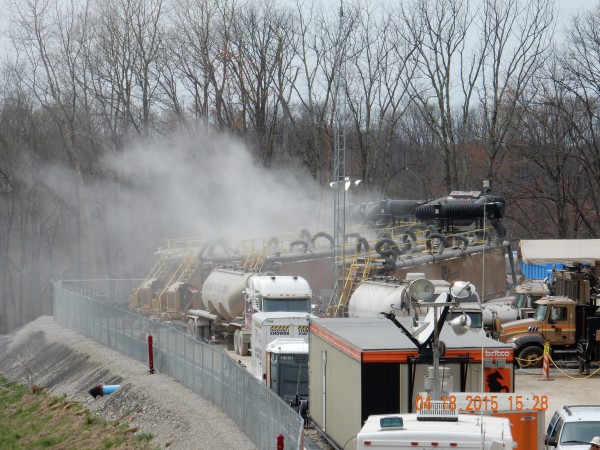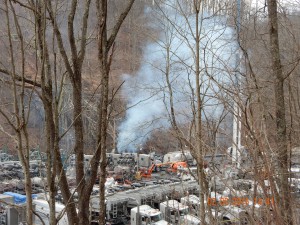
Part of the fracking process. Photo by Bill Hughes.
Fracking outrages a lot of people, because we pay such a high price in terms of our health and our environment, all so that the gas companies can make huge profits. But are they in fact making huge profits… or any profits at all?
DeSmog Blog has had a whole series of stories saying that the gas industry, and the shale oil industry as well, have been basically losing their shirts for the whole decade or so that the “miracle of hydraulic fracturing” has been turning this country into “Saudi America.” The Institute for Energy Economics and Financial Analysis has put out a report titled, “U.S. Fracking Companies in Appalachia Struggle Financially,” one of several with the same theme.
One way the industry hopes to fight its way up out of a sea of debt is through selling the natural gas liquids (NGLs) to the industry’s hoped-for petrochemical complex on the Ohio River, which would make the NGL into plastic. There are also plans to expand the existing petrochemical hub commonly known as Cancer Alley in Louisiana, as well as many others, here and abroad.
Politicians and the industry promote these hoped-for petrochemical expansions under the guise of “energy projects.” We must be clear. These are not projects to produce fuels, these are projects to use energy—a last ditch effort to turn a profit by turning fracked-gas into plastics.
But that effort could be a fool’s errand. A report by the energy research firm Wood Mackenzie says a supply glut may force the closure of some petrochemical facilities by the mid 2020s. And that’s probably without taking into account that there are new plastic bans going into effect all over; people around the world are seeking ways to avoid using plastic.
So it seems really questionable whether the filthy monstrosity threatening to choke the Ohio River will save the fracking industry or the chemical industry. Seems to me it’s at least a couple of years since I started reading stories about the shale boom; it’s clear that most companies have been losing money throughout the shale boom. Surely the industry analysts and investors know and knew at least as much as we do about this. This begs the question: why does the shale boom keep going? I’m speculating here, but I see two likely answers:
Wall Street, flush with cash after the bailout, was looking for something to invest in and this was handy. It’s long since been clear that it’s a bad bet but maybe they can’t find anything more promising to stuff their excess cash into. Anyway, I think the way this works, even if most of the drillers end up in bankruptcy, even if the investment houses have to write off bad loans… the top people in both the banks and the oil and gas industry are able to arrange to stuff their pockets while it lasts and then skip out, sailing off into the sunset under a golden parachute. Most likely, they can get away with offloading the losses onto others—including the areas that host these booms, when we’re left to pay for any cleanup.
That was reason number one. Number two focuses on government. One of the analysts in one of the news stories says general investors are saying “To heck with energy.” Well, that’s like the economist who said some years ago that “agriculture is only three percent of the economy so it doesn’t matter if it goes belly up from climate change,” revealing an astonishing lack of basic knowledge about the world. Fact is, some sectors are critical for real-world reasons regardless of economic theory. Food (ahem, derived from agriculture) is one of them and another is energy. If energy availability plummets, so does the economy.
Therefore, I suspect that the government is propping up the industry somehow. I see two major motives for this.
First, international politics. The glut of oil and gas from US fracked shale has lowered the world price, and a low oil price hurts Iran, Venezuela and Russia, all official “enemies” and all heavily dependent on oil sales. (Of course, there is a question as to whether a major reason they are all designated as enemies in the first place is that they are competitors for oil markets. But leaders of each of these countries have also committed the cardinal sin that will get you labeled a “rogue state” by the U.S. government and media—they refuse to take orders from Washington, D.C.)
But the other reason the government may be propping up the oil and gas companies in the face of steady financial losses has more to do with domestic politics. Rapid closing of the oil and gas spigots would mean skyrocketing prices for gasoline, heating fuel, and maybe electricity, which would be guaranteed to turn the public hostile to political incumbents. Spurring a more rapid replacement with renewables might help; instead the Trump Administration seems intent on slowing the transition. I presume this is because the coal and oil and gas companies are against it and they have so much power in D.C. Even if the Democrats take over in 2020, nothing will change unless there is an uprising—we need to make that happen!
Wall Street Journal: Oil and Gas Bankruptcies Grow as Investors Lose Appetite for Shale










